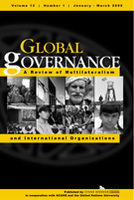http://journals.rienner.com/doi/abs/10.5555/1075-2846-19.4.611
Article Citation:
Oliver Stuenkel (2013) The Financial Crisis, Contested Legitimacy, and the Genesis of Intra-BRICS Cooperation. Global Governance: A Review of Multilateralism and International Organizations: October-December 2013, Vol. 19, No. 4, pp. 611-630.
The rise of the BRIC grouping (Brazil, Russia, India, China) is one of the most commented on phenomena in international politics of the past years. Yet little is known about how and why institutionalized cooperation between the BRIC countries began. This article makes two arguments. First, an unprecedented combination in 2008—a profound financial crisis among developed countries, paired with relative economic stability among emerging powers—caused a legitimacy crisis of the international financial order, which led to equally unprecedented cooperation between emerging powers in the context of the BRIC grouping. The BRIC countries were able to use their temporarily increased bargaining power to become agenda setters at the time—culminating in the International Monetary Fund quota reforms agreed on in 2010. This shows that even short periods of reduced legitimacy in global governance can quickly lead to the rise of alternative institutions—such as, in the case of the crisis that began in 2008, the BRIC platform—which now forms part of the landscape of global governance. Second, intra-BRIC cooperation in the area of international finance enhanced trust among the BRIC countries and led to a broader type of cooperation in many other areas, suggesting the occurrence of spillover effects. Intra-BRICS cooperation (Brazil, Russia, India, China, South Africa) is therefore likely to continue, even after the conditions that facilitated its genesis—the crisis in the West—have disappeared.
Download full article here.
Keywords: BRIC, BRICS, G-20, global governance, legitimacy
Published Online: October 2013
Oliver Stuenkel is assistant professor of international relations at the Getulio Vargas Foundation in São Paulo, where he coordinates the São Paulo branch of the School of Social Science and the executive program in international relations. He is also a nonresident fellow at the Global Public Policy Institute in Berlin.
Read also:









